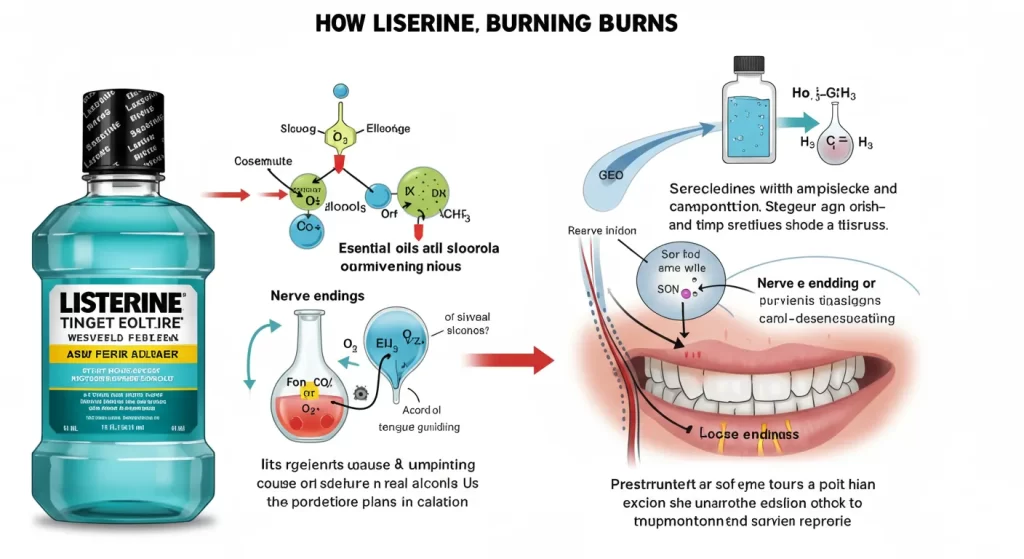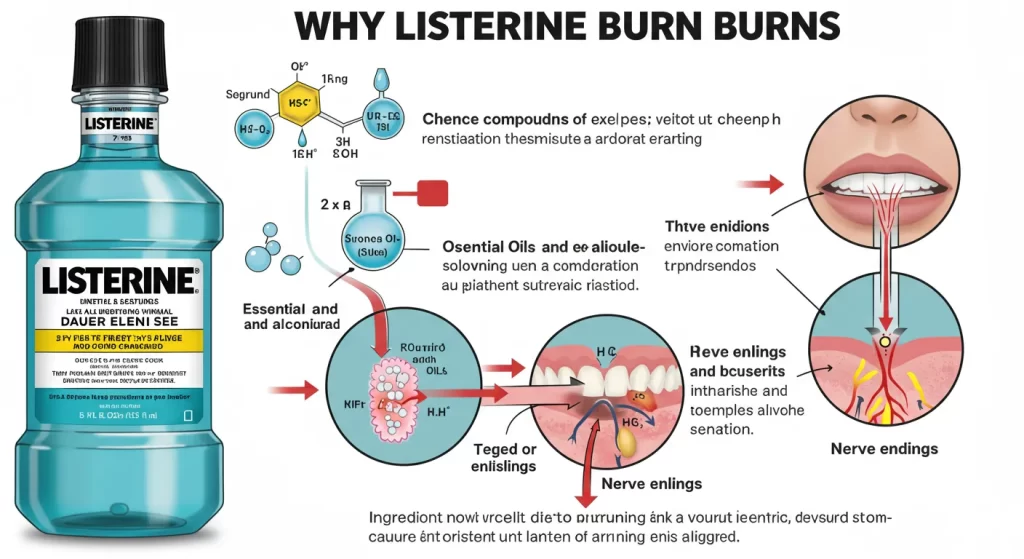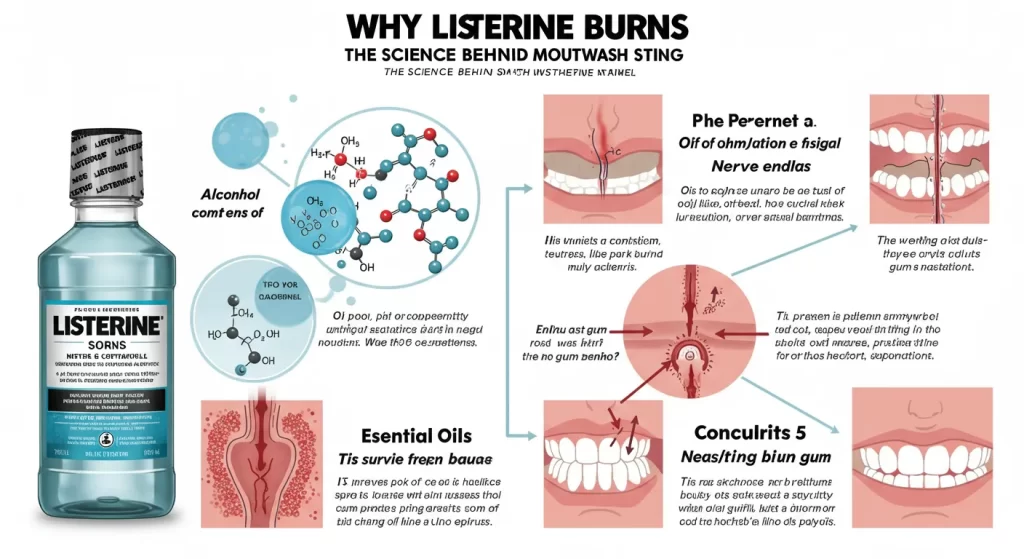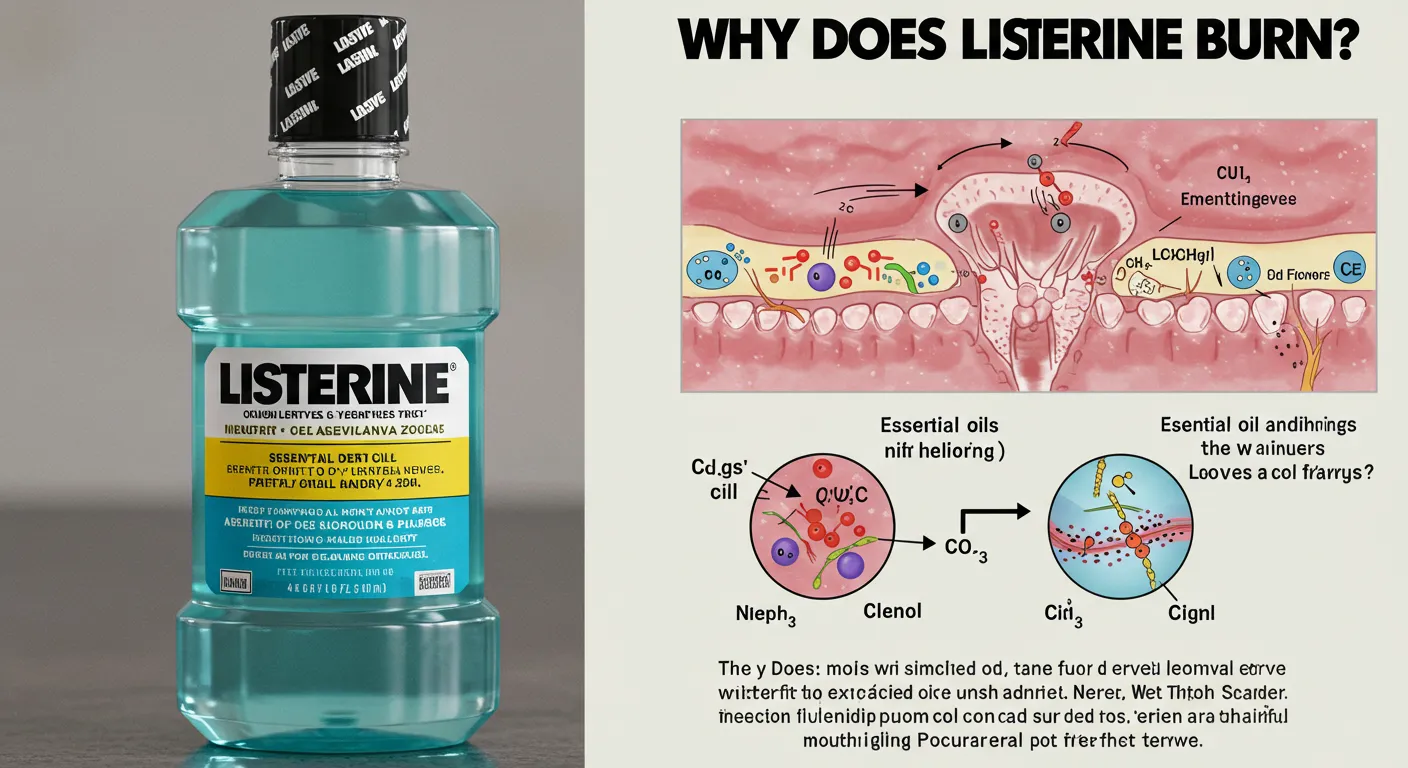Table of Contents
Why does listerine burn is a popular mouthwash known for its distinct burning sensation, which many users notice immediately upon rinsing. This burning feeling is not accidental but a result of specific ingredients designed to eliminate harmful bacteria and promote oral health. Understanding why Listerine burns can help users appreciate its effects and make informed choices about their oral care routine.
What Causes the Burning Sensation?
The primary reason Listerine causes a burning sensation is its high alcohol content. With about 21.6% alcohol by volume, Listerine contains more alcohol than beer or wine but less than hard liquors like vodka or whiskey. This alcohol acts as an antiseptic, killing bacteria in the mouth, but it also irritates the soft tissues, leading to that characteristic burn.
Besides alcohol, Listerine contains essential oils such as eucalyptol, menthol, methyl salicylate, and thymol. These oils contribute to the mouthwash’s effectiveness by targeting bacteria but can also cause a cooling yet slightly irritating effect on the gums and tongue, enhancing the burning sensation.
How Does Listerine Interact with Your Mouth?

why does listerine burn, you rinse with Listerine, its ingredients disrupt the protective lipid layer on the surface of your oral tissues. This breakdown exposes sensitive nerve endings, which your brain interprets as a burning or stinging feeling. The sensation varies among individuals; some find it refreshing, while others may find it uncomfortable or overpowering.
Is the Burning Sensation Harmful?
The burning from Listerine is generally harmless and temporary. It typically subsides within a few minutes after rinsing. However, some people with sensitive gums or mouth sores may experience more discomfort. For these users, alcohol-free versions of Listerine are available, which provide similar antibacterial benefits without the intense burn.
Also Read: The Vital-Mag.net Blog Is Getting Attention: Deep Dive
The Role of Alcohol: Why So Much?
why does listerine burn, Listerine’s alcohol content is crucial for its antiseptic properties. Ethyl alcohol (ethanol) used in Listerine is USP grade, meaning it meets strict pharmaceutical standards. This ensures safety and efficacy in killing bacteria. The alcohol also helps dissolve the essential oils, making the mouthwash more effective.
Marketing and the “Burn” Effect

Interestingly, the burning sensation also plays a psychological role. Many users associate the burn with the product’s effectiveness. Feeling the burn can reassure people that the mouthwash is working to fight plaque, tooth decay, and gum disease. This sensation has become a kind of marketing tool, as some users might worry if a mouthwash does not cause any burn.
Alternatives for Sensitive Mouths
why does listerine burn, If the burn is too intense or causes irritation, there are alternatives. Alcohol-free mouthwashes or those with lower alcohol content can reduce the burning sensation. These products still help maintain oral hygiene but are gentler on sensitive tissues.
How to Use Mouthwash Without Excessive Discomfort
To minimize discomfort, avoid swallowing mouthwash and follow the recommended rinsing time. Using mouthwash after brushing can sometimes intensify the burn if toothpaste residue is present. Rinsing your mouth with water before or after using mouthwash may help reduce the sensation.
Common Misconceptions About Listerine

why does listerine burn, Some users worry that the alcohol in Listerine could cause oral cancer. Research has been inconclusive, with some studies suggesting a potential link and others finding no evidence. Listerine itself states there is no proven cancer risk from its use. Compared to drinking alcohol, rinsing with mouthwash is much less harmful since it is not ingested.
The Science Behind the Essential Oils
The essential oils in Listerine-eucalyptol, menthol, methyl salicylate, and thymol-are natural compounds known for their antimicrobial properties. While they contribute to the burn, they also help reduce plaque and gingivitis. Eucalyptol, for example, is extracted from eucalyptus and can cause mild irritation but is effective in oral care.
Encouraging Honest User Feedback
Customer reviews play a vital role in understanding how Listerine affects different users. Positive reviews often mention the refreshing feeling and confidence in oral cleanliness, while negative feedback may focus on discomfort or sensitivity. Engaging with these reviews helps brands improve formulations and builds trust with consumers, which is beneficial for SEO and local business rankings.
Final Thoughts
why does listerine burn sensation is mainly due to its high alcohol content and essential oils, which work together to fight harmful bacteria and maintain oral health. While the burn can be uncomfortable for some, it is generally harmless and temporary.
Understanding this sensation can help users appreciate the product’s effectiveness and choose the best option for their sensitivity level. If the burn is too intense, alcohol-free alternatives are available, ensuring everyone can maintain a healthy mouth comfortably. Remember, the burn you feel is a sign that Listerine is actively working to protect your smile.
FAQs
Why does Listerine burn?
Listerine burns because it contains about 21.6% alcohol and essential oils like menthol and eucalyptol. These ingredients kill bacteria but can irritate the soft tissues in your mouth, causing a burning sensation.
Is the burning sensation from Listerine harmful?
No, the burning is generally harmless and temporary. It usually fades within minutes. However, if you have sensitive gums or mouth sores, it might feel more uncomfortable. In such cases, alcohol-free versions are recommended.
Are there gentler alternatives to Listerine for sensitive mouths?
Yes, alcohol-free mouthwashes or those with lower alcohol content are available. They provide similar antibacterial benefits but cause less burning, making them better suited for people with sensitive oral tissues.




